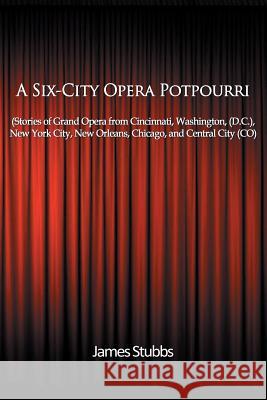A Six-City Opera Potpourri: Stories of Grand Opera from Cincinnati, Washington (D.C.), New York City, New Orleans, Chicago, and Central City (CO) » książka
A Six-City Opera Potpourri: Stories of Grand Opera from Cincinnati, Washington (D.C.), New York City, New Orleans, Chicago, and Central City (CO)
ISBN-13: 9781508484837 / Angielski / Miękka / 2015 / 126 str.
A Six-City Opera Potpourri: Stories of Grand Opera from Cincinnati, Washington (D.C.), New York City, New Orleans, Chicago, and Central City (CO)
ISBN-13: 9781508484837 / Angielski / Miękka / 2015 / 126 str.
(netto: 22,71 VAT: 5%)
Najniższa cena z 30 dni: 23,97
ok. 16-18 dni roboczych
Bez gwarancji dostawy przed świętami
Darmowa dostawa!
Flashbacks are not uncommon in books and movies. Flash-forwards are less common. This description of "A Six-City Opera Potpourri" begins with the final two paragraphs of the book, which constitutes a flash-forward. If you would like to know how opera has reached this point, or disagree with its portrayal, the book will be of interest. Here are the closing paragraphs. Details are in the book. "Changes have crept into the opera world since the six-city tour ended. They have accelerated since 2000 and some are startling. Just using the small sample of operas I've chosen to review and discuss proves the point. "The Nose" set uses a backdrop that for all the world resembles a "Movietone newsreel" from the late 1920's to the '60's. In the Met's new production of "The Barber of Seville" we are brought right up to the present when Figaro throws open the huge doors of his traveling barber shop and surprises two homosexuals kissing. In the Royal Opera House' "Faust," we are transported from Gounod's beautiful French countryside to the dingy, dark, stone streets and buildings of Paris. In ACT IV we see Mephistopheles in drag wearing a black dress with sequins and a tiara. There is a sexually explicit routine at the end of the ballet. The Met's new "Rigoletto" is a Michael Mayer production of Verdi's opera moved ahead centuries in time to a Las Vegas casino in 1960. It depicts (the) "Duke" as a cocaine-snorting lounge singer. The previous paragraphs describe, in some detail, Willy Decker's "La Traviata," which is solidly in the group of departures from the composer's intent. This one may be the "gold standard." These people design and produce operas but they aren't opera people. They're Chagall, Warhol, and Picasso people. Peter Gelb, General Manager of the Metropolitan Opera Company, speaks against going back to the "stone Ages of opera theater." These "stone ages" are the years that the opera world has named "The Golden Age of Opera."
Zawartość książki może nie spełniać oczekiwań – reklamacje nie obejmują treści, która mogła nie być redakcyjnie ani merytorycznie opracowana.











